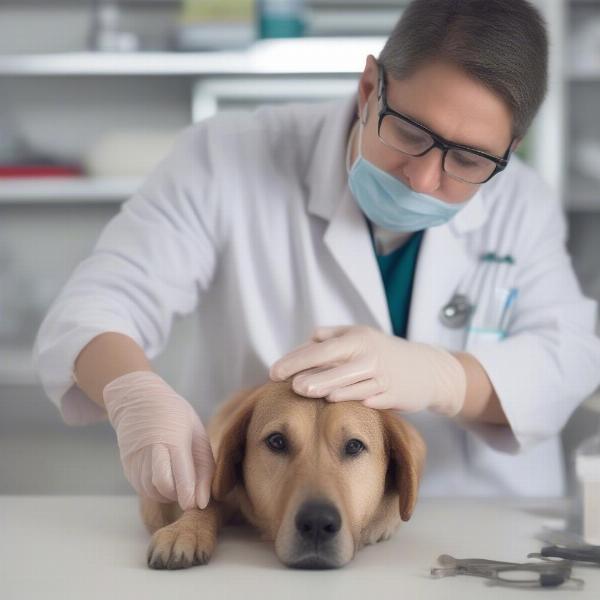If you’ve noticed black spots on your dog’s skin, you’re likely concerned about what they might be. Black spots can be caused by a variety of factors, ranging from completely harmless pigmentation to more serious medical conditions. Understanding the potential causes is crucial for providing your furry friend with the appropriate care. This article will explore the different reasons why your dog might have black spots, how to differentiate between them, and when it’s time to seek veterinary attention.
Common Causes of Black Spots on Dog Skin
Black spots on your dog’s skin can appear for several reasons, some of which are perfectly normal while others might require a vet visit. Let’s delve into the most common culprits:
Hyperpigmentation
Hyperpigmentation is simply an increase in melanin, the pigment that gives skin its color. This is a common and generally harmless condition, particularly in older dogs. It can occur in areas where the skin has been inflamed or injured, or simply as part of the aging process. Think of it like age spots in humans. These spots are usually flat and don’t cause any itching or discomfort.
Insect Bites and Allergies
Fleas, ticks, and mites can all cause skin irritation, leading to inflammation and subsequent hyperpigmentation. If your dog is allergic to certain environmental factors, such as pollen or dust, this can also manifest as skin irritation and black spots. These spots might be accompanied by redness, itching, and hair loss.
Infections
Bacterial or fungal infections can also cause black spots on your dog’s skin. These infections can range from mild to severe, and the spots might be accompanied by other symptoms like a foul odor, discharge, or pain.
Lentigo
Lentigo are dark, flat spots similar to freckles that are often seen in certain breeds, particularly those with short coats. Like hyperpigmentation, they are generally harmless and don’t require treatment.
Skin Tumors
While less common, black spots can sometimes be a sign of a skin tumor. These spots might be raised, irregularly shaped, or rapidly growing. It’s essential to have any suspicious skin changes checked by a veterinarian.
When to See a Vet
While many black spots are benign, it’s always best to err on the side of caution. Consult your veterinarian if you notice any of the following:
- Rapid changes in size, shape, or color of the spots
- Itching, redness, or swelling around the spots
- Hair loss in the affected area
- Discharge or a foul odor emanating from the spots
- Your dog seems uncomfortable or in pain
Determining the Cause of Black Spots
Your veterinarian will likely perform a physical examination and may recommend further diagnostic tests, such as skin scrapings, biopsies, or blood tests, to determine the underlying cause of the black spots.
 Vet Examining Dog Skin
Vet Examining Dog Skin
Preventing Black Spots on Dog Skin
While not all black spots are preventable, you can take steps to minimize the risk:
- Regular parasite prevention: Use flea and tick preventatives year-round.
- Allergy management: If your dog has allergies, work with your vet to manage them effectively.
- Good hygiene: Keep your dog’s skin clean and dry.
- Regular veterinary checkups: Early detection and treatment of any skin conditions can prevent them from worsening.
Conclusion
Black spots on your dog’s skin can stem from various causes, some harmless and others requiring veterinary intervention. Regularly checking your dog’s skin and seeking professional advice when necessary can help ensure your furry companion’s health and well-being. Remember, early detection is key to addressing any potential problems effectively. If you are concerned about any changes in your dog’s skin, don’t hesitate to contact your veterinarian.
FAQ
-
Are black spots on dog skin always a sign of something serious? No, many black spots are benign, like hyperpigmentation or lentigo. However, it’s crucial to have any changes checked by a vet to rule out more serious conditions.
-
Can allergies cause black spots on my dog’s skin? Yes, allergies can lead to skin irritation and inflammation, which can result in hyperpigmentation and black spots.
-
How can I prevent my dog from getting black spots on their skin? Regular parasite prevention, allergy management, and good hygiene can help reduce the risk of some types of black spots.
-
What should I do if I notice a new black spot on my dog? Monitor the spot for any changes and consult your veterinarian if you have any concerns.
-
Can black spots on dog skin be cancerous? In some cases, black spots can be a sign of skin cancer. It’s important to have any suspicious skin changes evaluated by a veterinarian.
-
What tests might a vet perform to diagnose the cause of black spots? Your vet might perform a physical exam, skin scrapings, biopsies, or blood tests.
-
Are certain dog breeds more prone to developing black spots? Yes, some breeds, particularly those with short coats, are more prone to lentigo.
ILM Dog is a leading international dog care website dedicated to providing expert advice on all aspects of dog ownership. From breed selection and puppy care to senior dog health and training tips, we offer a wealth of resources for dog lovers worldwide. We specialize in dog health, nutrition, behavior, and product recommendations. For expert advice tailored to your dog’s needs, contact us via email at [email protected] or phone at +44 20-3965-8624. ILM Dog is your trusted partner in responsible dog ownership.